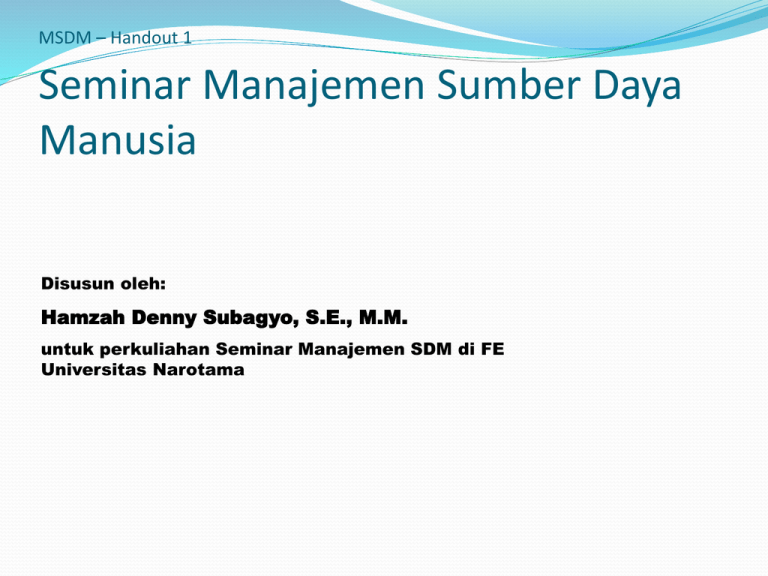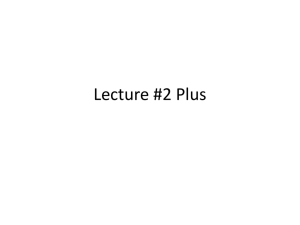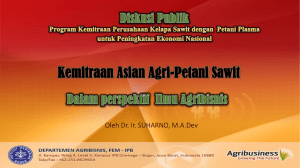Handout No 01 Seminar MSDM
advertisement

MSDM – Handout 1 Seminar Manajemen Sumber Daya Manusia Disusun oleh: Hamzah Denny Subagyo, S.E., M.M. untuk perkuliahan Seminar Manajemen SDM di FE Universitas Narotama PERANAN SDM DALAM PROSES TRANSFORMASI ORGANISASI STUDI KASUS DI PT. TELKOM TAHUN 2003 s.d 2006 Referensi : Hermawan Kartajaya, et. al. On Becoming A Customer-Centric Company PT Gramedia Pustaka Utama 2004 HAMZAH DENNY SUBAGYO dennysaloon@gmail.com http://dennyhamzah.blogspot.com 0857.30.11.55.22 2 MENGAPA ORGANISASI HARUS MELAKUKAN TRANSFORMASI ? 3 ??? UNCERTANTY turbulensi BISNIS INFOCOM 5 Turbulensi bidang teknologi Konvergensi digital Ditandai dengan “bersatunya” : tek. Pengolahan data (computing) tek. Content dan multimedia digital tek. Telekomunikasi 6 Turbulensi bidang regulasi Privatisasi incumbent operator (Konsekuensi Ratifikasi WTO-UU No. 7/94 tgl 2-11-94, lalu pasal 33 UUD 45 kemana?) Pembukaan pasar dan perubahan paradigma pengelolaan otoritas telekomunikasi dari monopolistic approach market-based approach (UU No.36/99) Pembentukan badan regulasi independen untuk menjamin kompetisi yang sehat dan fair (BRTI KepmenHub No.31/2003) 7 Turbulensi bidang Kompetisi Hypercompetition akibat munculnya new player dlm jumlah yg besar dan strategi yang canggih.(Interkoneksi fourth protocol of General Agreement to Trade in Services, 1997; Transparency, non discrimination, cost based tariff) Munculnya latent kompetitor yang sulit teridentifikasi oleh incumbent operator Ancaman menakutkan karena layanan substitusi (killer app) yg berdampak disruptive kpd industri ini secara keseluruhan. Lisensi (Perizinan); sederhana, proses yg transparan, adil, tdk diskriminatif, penyelesaian singkat. 8 Dealing with the Competition (P.Kotler) Poor firms ignore their competitors, average firms copy their competitors, winning firms lead their competitors. 9 Turbulensi bidang pasar Naiknya Bargaining Position pelanggan, akibat dari digusurnya monopoli dan pembukaan pasar. Key success factor-nya adalah customization yang dijadikan rule of the game masing-masing pemain. Semakin fokus pada pelanggan, mampu memberikan paket-paket solusi buat persoalan yg dihadapi pelanggan. 10 Porter’s five forces Potential Entrants (threat of Mobility) Suppliers (Supplier power) Industry competitors (segment rivalry) Buyers (Buyer Power) Substitutes (threat of substitutes) 11 Apa konsep organisasi ? ??? 12 Visi : “Menjadi Dominan InfoCom Player di kawasan Regional” Langkah strategis menghadapinya Misi : 1. Memberikan layanan “One Stop Services” dengan kualitas prima dan harga kompetitif. 2. Mengelola usaha dengan cara yang terbaik, dengan mengoptimalkan SDM yang unggul, teknologi yang kompetitif serta Business Partner yang sinergi Grand strategy pendekatan Customer Centric, kemampuan memahami kebutuhan, problem dan harapan pelanggan (di samping kapabilitas penguasaan teknologi, kepemilikan jaringan, dan kemampuan memproduksi layanan). 13 Evolving views of marketing’s role in the company F P M P F F M M HR HR P HR F P=Production F=Finance HR= Human Resources M=Marketing P M Customer Cus P F HR M HR 14 Gaps model of Service Quality customer Expected Service Competitor Experience Promotion media Customer gap Perceived Service Gap 1 Service Delivery Gap 3 Gap 4 External communications To customers Customer-driven Service design and standard Gap 2 company Company perception of Consumer expectations 15 WHAT S P S D T S T M C C C C B WHY P V HOW S CONSULTING 16 The strategic conseptual framework COMPANY PRODUCER 2C SELLER 2.5C MARKETER 3C SPECIALIST 3.5C SERV.PROVIDER 4C Type of Company Production Oriented Selling Oriented Marketing Oriented Market Driven Customer Driven Operational Efficiency Persuasive Selling Market Effectiveness Niche Selectivity Database Accountability Product Standardization Product Featuring Product Differentiation Product Specialization Product Customization Mass Distribution Mass Promotion Balanced Promotion Integrated Communication Interactive Communication WHAT Type of information Production Distribution Product Promotion Market, Customer, Competitor Niche Expectation Mix Sensitivity Cust.Value Package Life Time Value WHY Type of Analysis Internal Variance Cost Benefit External Competitive Market Response Customer Value HOW Quality Manag. OK QC QA TQM TQS Key Success Factor 17 Determinants of Customer Delivered Value (CDV) Image Value Personnel Services Value Value Product Value Total Customer Value (-) Psychic Cost Energy Cost Time Cost Monetary Cost Total Customer Cost CDV 18 S T V Type of Marketing No Marketing Mass Marketing Segmented Marketing Niche Marketing Individualized Marketing SEGMENTATION Geographics Demographics Psychographics Behavioral Individualized TARGETING Everyone Suitables Ones Chosen Ones A Few Good Ones Someone POSITIONING The Only One The Better One One Statement Different Ones One on One DIFFERENTIATION Good for Company 4A Assortment Affordable Available Announcement Better than Competitor 4B Best Bargaining BufferStocking Bombarding Preferred by Customer 4P Product Price Place Promotion Specialized for Niches 4V Variety Value Venue Voice Customized for Individuals 4C Cust.Solution Cost Convenience Communication SELLING Informing about Product Feature Selling Benefit Selling Solution Selling Interacting for Success BRAND Just a Name Perceived Quality Brand Loyalty SERVICE One Business Category Value-Added Business Value-in Use Business Cust.Satisfying Business The Only Business Category PROCESS SOP Implementation Interfunctional Team Work Functional Streamlining Total Delivery Reenginering Extended Value Chain MARK.MIX Brand Awareness Brand Association 19 ? Telepon, Telex, Faks, Radio, TV Audio, Teks, Gambar, Video, telephony, videoconference, tv kabel disalurkan dalam satu infrastruktur yang sama (konvergensi). Lahir pula company convergence infocom services convergence, melalui aliansi, partnership, merger, akuisisi. 20 ?? Dari POTS ke PMM Infocom supermarket One stop shop solution Full network services provider Lima pilar bisnis; fixed line, fixed wireless, mobile, internet, dan inter carrier. Segmen; OLO (by Carrier&Interconnection Service Center), korporat (by ESC), individu/residensial (by: DIVRE) 21 ??? Struktur org.; penegasan beda peran product owner(cost center) dengan delivery channel (revenue center) Sistem pengelolaan sdm; sis.pran, sis.pengukuran kinerja, sis.info eksekutif CBHRM; marketing & services, teknologi infocom, shared services, business skill. Leadership style; link & friendly; empowerment & accountability, manag.by walking around, serving to cust.,peers, and partners, respect to quality and contribution. 22 Faktor yang menentukan sukses 7S-McKinsey Strategy Structure Systems Style Staff Temuan I. Tom Peters & Robert Waterman (1982) Shared Value TTW- 135 Skill 23 Komponen penting agar perush bertahan lama Core values TTW-135 Purpose TEMUAN II. JIM COLLINS & JERRY PORRAS (1995) 24 4 Faktor Sukses (primary business practises) Strategy Execution Culture TTW-135 Structure TEMUAN III. WILLIAM JOYCE, NITIN NOHRIA & BRUCE ROBERSON (2003) 25 Secondary business practice Talent Leadership Innovation Merger & Partnerships. 26 ROADMAP TRANSFORMASI CUSTOMER INTENTION CENTRIC (CIC) CUSTOMER SERVICE CENTRIC 2006 ULTIMATE CIC 2005 MARKET CENTRIC 2003 2004 PEMILAHAN UBIS BDSR SEGMENTASI TAHAP AWAL UCC DI EnterpriseServiceCenter SEGMENTASI ORG.MATRIX C2SE TTW-135 OGDC SINGLE MULTI LINE BUSINESS 27 *** Strictly Confidential Transformasi Organisasi 2002 MARKET CENTRIC KD 44 & 49 • Penataan portofolio bisnis 2003 MARKET CENTRIC 1. Implementasi KD 49 2. CAM 2004 5 pilar bisnis • Multi bisnis • Quasi-holding • Implementasi KD 49. 3. ND Dirut No. 140: a.Segmentasi Pelanggan: PC, CC, OLO b.Struktur Pengelolaan Pelanggan, yaitu: • Personal oleh DIVRE • Corporate oleh ESC • OLO oleh CISC 4. KD 43: PO Cost center DC Revenue center 2004 2005 CUST SERVICE CENTRIC CUST INTENTION CENTRIC 1. Corporate • Refining KD 49, menjadi KR.01 tentang struktur Organisasi • Penataan Asisten di DitJasa • Penambahan RO di IA 2. Penataan Unit Bisnis • PO Cost Center • Fungsi channel ke Divre • MM/LD/FWA mjd PO • ESC mjd Koord. UCC (BKO) 3. Penataan Divre • Standarisasi Divre • UCC di-BKO ke ESC • UIM dilikuidasi • Unit Sisfo mjd RO ISC • Unit baru Flexy & MM/Internet • Penataan manajemen jaringan akses • BKO Unit Bisnis Pendukung di DitSDM • BKO Unit MSC, TCC, ISC,R&DC dari Dit.SDM ke DitJar. 1. Corporate • Alignment Direktorat dengan Unit Bisnis • DitJasa Dit.Corp.Cust. dan Dit.PersonalCust. • DitJar Dit.Infer Carrier • Dit.SDM&Biskung dan DitKUG Tetap 2. Pembentukan Channel Distribution • CISC Div. CIS • ESC Div.Corp.Cust • Divre Div.Personal Cust. + Reg. Network 3. Alignment semua Unit Bisnis ke Direktorat terkait 28 PERAN SDM MENGAWAL TRANSFORMASI MENGHADIRKAN ROLE MODEL/LEADER DRIVEN ORG. MENYIAPKAN/MELAKSANAKAN SYSTEM YG COCOK MENCIPTAKAN/SOSIALISASI BUDAYA KERJA BARU LEADERSHIP STYLE BARU. LINK & FRIENDLY, W.A.M EMPOWERED AND ACCOUNTABLE MANAGING ANY TIME, ANY WHERE SERVING TO CUSTOMERS, PEERS, PARTNERS RESPECT TO QUALITY AND CONTRIBUTION 29 Thank you for your attention 30

